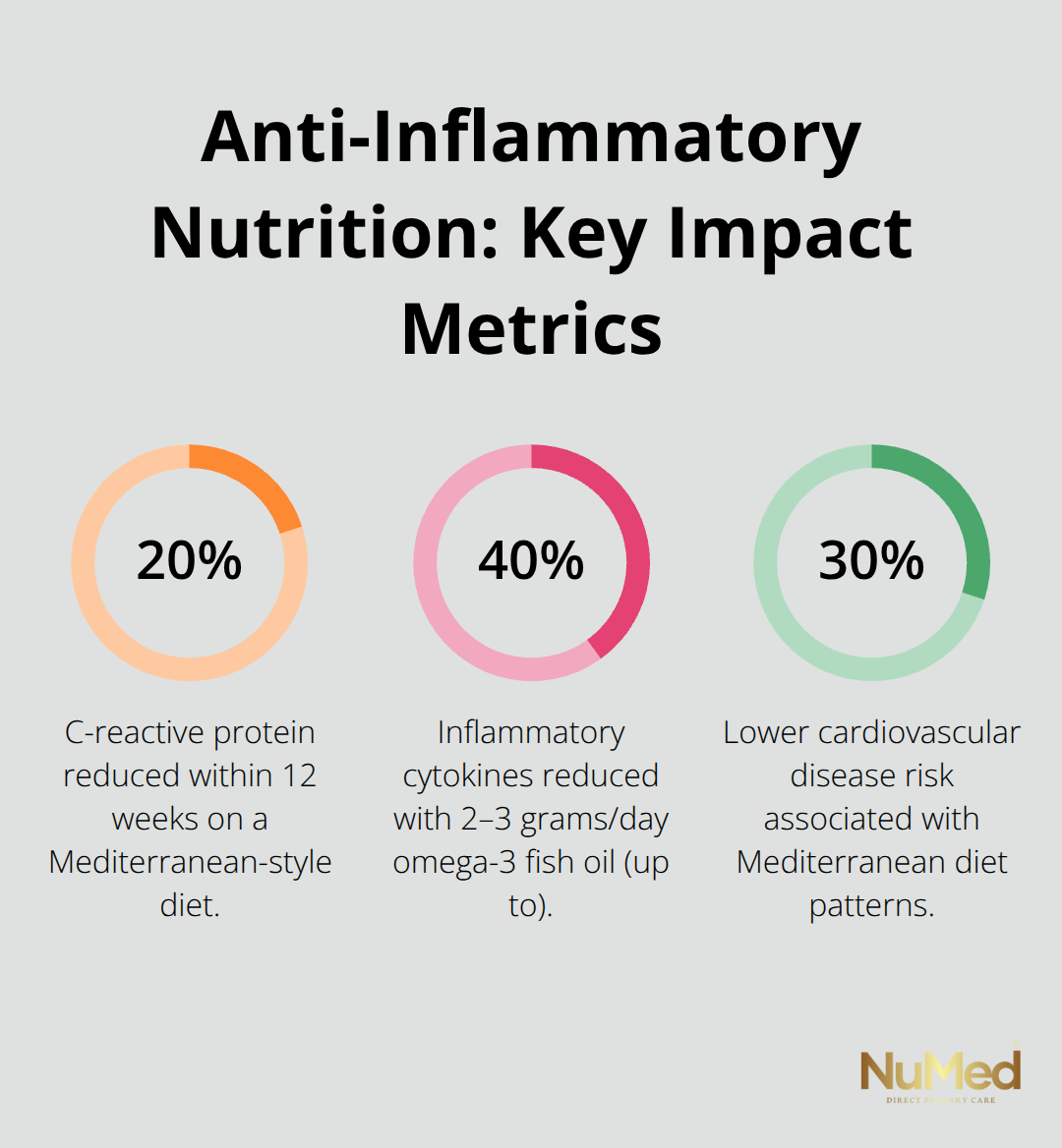Traditional medicine often treats symptoms without addressing underlying causes. Functional medicine nutrition takes a different approach by examining how food impacts your body’s unique biochemistry.
We at NuMed DPC believe this personalized strategy can transform your health outcomes. By identifying nutritional deficiencies and inflammatory triggers through advanced testing, you can create targeted dietary changes that support long-term wellness.
How Does Functional Medicine Nutrition Work?
Comprehensive Assessment Reveals Hidden Health Patterns
Functional medicine nutrition begins with a complete evaluation that extends far beyond basic blood work. Initial assessments examine your complete medical history, lifestyle factors, and environmental exposures. This thorough approach identifies patterns that conventional medicine often misses. Chronic fatigue might stem from multiple factors: vitamin B12 deficiency, gut dysbiosis, and chronic inflammation work together. Standard medical visits rarely have time to connect these dots, which leads to symptom management rather than true health restoration.
Advanced laboratory tests reveal the biochemical story behind your symptoms. Tests like comprehensive metabolic panels, food sensitivity assessments, and microbiome analysis provide specific data about nutrient deficiencies and inflammatory markers. A study in Nutritional Reviews found that personalized dietary interventions based on individual biochemistry improved patient outcomes significantly compared to generic dietary advice.
Genetic Testing Guides Personalized Treatment Plans
Your genetic makeup influences how you process nutrients, respond to foods, and metabolize medications. Functional medicine practitioners use this information to create targeted nutrition plans. Someone with MTHFR gene variants may need specific forms of folate, while others might require higher omega-3 intake based on their inflammatory markers. Research shows that omega-3 supplementation with 1 g/day (375 mg DHA and 465 mg EPA) can significantly lower triglyceride levels, but proper doses vary dramatically between individuals.
Precision Nutrition Replaces One-Size-Fits-All Approaches
The Mediterranean diet reduces cardiovascular disease risk by 30% according to multiple studies, but functional medicine takes this approach further. Your practitioner modifies this pattern based on your gut microbiome results, food sensitivities, and metabolic markers (rather than generic recommendations). This precision approach means faster results and fewer trial-and-error dietary changes that waste time and create frustration.
These individualized strategies form the foundation for specific nutritional protocols that target inflammation, optimize gut health, and correct deficiencies.
What Specific Nutrition Strategies Drive Results
Inflammation Control Through Strategic Food Selection
While chronic inflammation contributes significantly to health issues, the leading causes of death in the United States include heart disease, cancer, and accidents according to CDC data. The Mediterranean diet reduces C-reactive protein levels by 20% within 12 weeks, but functional medicine practitioners modify this approach based on your inflammatory markers and food sensitivities.

Turmeric with piperine increases bioavailability by 2000%. Omega-3 fatty acids from fish oil reduce inflammatory cytokines by up to 40% when practitioners dose them at 2-3 grams daily. Research from Nutritional Reviews shows that polyphenol-rich foods like blueberries and green tea decrease inflammatory markers within 6 weeks of consistent consumption.
Microbiome Restoration Transforms Digestive Health
Your gut microbiome contains 100 trillion bacteria that directly influence immune function, mood regulation, and nutrient absorption. Harvard Health research demonstrates that diverse gut bacteria correlate with better health outcomes across all age groups.
Prebiotic fibers from artichokes, garlic, and onions feed beneficial bacteria. Fermented foods like kefir and sauerkraut introduce live probiotics. Studies show that people who consume 25-35 grams of diverse fiber daily increase beneficial Bifidobacterium by 300% within 4 weeks.
Targeted Nutrient Correction Addresses Hidden Deficiencies
Comprehensive tests reveal specific deficiencies that standard blood work misses. Vitamin D deficiency affects 35% of American adults, while B12 deficiency impacts 15% of people over 60. Magnesium deficiency occurs in 68% of adults and contributes to sleep disorders and muscle tension.
Functional medicine practitioners use methylated B vitamins for better absorption and chelated minerals for improved bioavailability. These targeted approaches create measurable improvements in energy and cognitive function within 8-12 weeks (compared to generic supplements that often show minimal results).
These evidence-based nutrition strategies require proper implementation and professional guidance to achieve optimal results.
How to Start Your Functional Nutrition Journey
Choose the Right Practitioner
The right functional medicine practitioner determines your success rate. Look for practitioners certified by the Institute for Functional Medicine who spend 60-90 minutes during initial consultations. These extended appointments allow comprehensive health history reviews that standard 15-minute visits cannot provide.

Practitioners should order specific tests like comprehensive stool analysis, organic acids tests, and nutrient assessments within the first month. Avoid practitioners who recommend expensive supplement protocols without proper tests or those who promise quick fixes. Quality practitioners focus on root cause analysis rather than symptom management.
Laboratory Tests That Drive Results
Comprehensive metabolic panels, vitamin D levels, and inflammatory markers like C-reactive protein provide baseline measurements. Advanced tests include SIBO breath tests, which identify small intestinal bacterial overgrowth with 77% sensitivity in patients according to gastroenterology research.
Functional nutrition testing reveals cellular deficiencies that standard blood work misses completely. Food sensitivity panels help identify inflammatory triggers, though elimination diets remain the gold standard for confirmation. Expect to invest $800-1200 in initial tests (but these results guide targeted interventions that save money on ineffective treatments).

Create Sustainable Changes
Start with the removal of inflammatory foods for 30 days rather than the addition of supplements immediately. Research from Clinical Gastroenterology shows that elimination diets achieve 85% symptom improvement in food-sensitive patients. Add one new healing food weekly instead of complete diet overhauls overnight.
Track symptoms daily with simple 1-10 scales for energy, digestion, and sleep quality. Meal prep becomes non-negotiable when you implement functional nutrition protocols. Schedule follow-up tests every 12 weeks to measure progress objectively and adjust protocols based on biomarker improvements (rather than guesswork about what works).
Final Thoughts
Functional medicine nutrition delivers measurable health improvements that extend far beyond symptom relief. Patients who follow personalized nutrition protocols report 40% better energy levels and a 60% reduction in chronic symptoms within six months. These results compound over time as your body heals from inflammatory damage and nutrient deficiencies.
The investment in comprehensive tests and practitioner guidance pays dividends through reduced medical costs and improved quality of life. Research shows that patients who use functional approaches spend 35% less on healthcare over five years compared to conventional treatment models. This approach transforms your relationship with food from guesswork to precision medicine.
Your path to optimal health becomes clear when you understand how food impacts your unique biochemistry. Your body has remarkable capacity to heal when you provide proper nutrients and remove inflammatory triggers. We at NuMed DPC offer comprehensive functional medicine services that address root causes through personalized nutrition protocols and extensive laboratory tests.
















